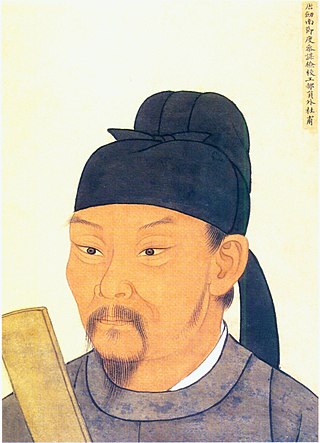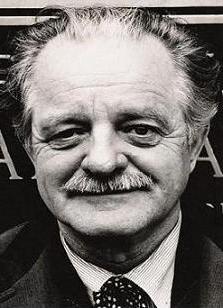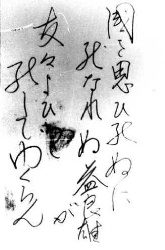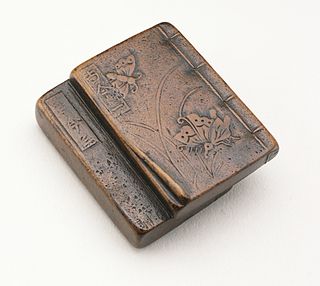
Gary Snyder is an American poet, essayist, lecturer, and environmental activist. His early poetry has been associated with the Beat Generation and the San Francisco Renaissance and he has been described as the "poet laureate of Deep Ecology". Snyder is a winner of a Pulitzer Prize for Poetry and the American Book Award. His work, in his various roles, reflects an immersion in both Buddhist spirituality and nature. He has translated literature into English from ancient Chinese and modern Japanese. For many years, Snyder was an academic at the University of California, Davis, and for a time served as a member of the California Arts Council.

Haiku is a type of short form poetry that originated in Japan, and can be traced back from the influence of traditional Chinese poetry. Traditional Japanese haiku consist of three phrases composed of 17 phonetic units in a 5, 7, 5 pattern; that include a kireji, or "cutting word"; and a kigo, or seasonal reference. However, haiku by classical Japanese poets, such as Matsuo Bashō, also deviate from the 17-on pattern and sometimes do not contain a kireji. Similar poems that do not adhere to these rules are generally classified as senryū.

Kakinomoto no Hitomaro was a Japanese waka poet and aristocrat of the late Asuka period. He was the most prominent of the poets included in the Man'yōshū, the oldest waka anthology, but apart from what can be gleaned from hints in the Man'yōshū, the details of his life are largely uncertain. He was born to the Kakinomoto clan, based in Yamato Province, probably in the 650s, and likely died in Iwami Province around 709.
The Man'yōshū is the oldest extant collection of Japanese waka, compiled sometime after AD 759 during the Nara period. The anthology is one of the most revered of Japan's poetic compilations. The compiler, or the last in a series of compilers, is today widely believed to be Ōtomo no Yakamochi, although numerous other theories have been proposed. The chronologically last datable poem in the collection is from AD 759 (No. 4516). It contains many poems from a much earlier period, with the bulk of the collection representing the period between AD 600 and 759. The precise significance of the title is not known with certainty.

Tanka is a genre of classical Japanese poetry and one of the major genres of Japanese literature.

Matsuo Bashō; born Matsuo Kinsaku, later known as Matsuo Chūemon Munefusa was the most famous Japanese poet of the Edo period. During his lifetime, Bashō was recognized for his works in the collaborative haikai no renga form; today, after centuries of commentary, he is recognized as the greatest master of haiku. He is also well known for his travel essays beginning with Records of a Weather-Exposed Skeleton (1684), written after his journey west to Kyoto and Nara. Matsuo Bashō's poetry is internationally renowned, and, in Japan, many of his poems are reproduced on monuments and traditional sites. Although Bashō is famous in the West for his hokku, he himself believed his best work lay in leading and participating in renku. As he himself said, "Many of my followers can write hokku as well as I can. Where I show who I really am is in linking haikai verses."

Sir Edwin Arnold was an English poet and journalist. He is best known for his 1879 work, The Light of Asia.

Du Fu was a Chinese poet and politician during the Tang dynasty. Together with his elder contemporary and friend Li Bai, Du is often considered one of the greatest Chinese poets. His greatest ambition was to serve his country as a successful civil servant, but Du proved unable to make the necessary accommodations. His life, like all of China, was devastated by the An Lushan Rebellion of 755, and his last 15 years were a time of almost constant unrest.

The Kokin Wakashū, commonly abbreviated as Kokinshū (古今集), is an early anthology of the waka form of Japanese poetry, dating from the Heian period. An imperial anthology, it was conceived by Emperor Uda and published by order of his son Emperor Daigo in about 905. Its finished form dates to c. 920, though according to several historical accounts the last poem was added to the collection in 914.

Kenneth Charles Marion Rexroth was an American poet, translator, and critical essayist. He is regarded as a central figure in the San Francisco Renaissance, and paved the groundwork for the movement. Although he did not consider himself to be a Beat poet, and disliked the association, he was dubbed the "Father of the Beats" by Time magazine. Largely self-educated, Rexroth learned several languages and translated poems from Chinese, French, Spanish, and Japanese.

The death poem is a genre of poetry that developed in the literary traditions of East Asian cultures—most prominently in Japan as well as certain periods of Chinese history and Joseon Korea. They tend to offer a reflection on death—both in general and concerning the imminent death of the author—that is often coupled with a meaningful observation on life. The practice of writing a death poem has its origins in Zen Buddhism. It is a concept or worldview derived from the Buddhist teaching of the three marks of existence, specifically that the material world is transient and impermanent, that attachment to it causes suffering, and ultimately all reality is an emptiness or absence of self-nature. These poems became associated with the literate, spiritual, and ruling segments of society, as they were customarily composed by a poet, warrior, nobleman, or Buddhist monk.

Arthur David Waley was an English orientalist and sinologist who achieved both popular and scholarly acclaim for his translations of Chinese and Japanese poetry. Among his honours were appointment as Commander of the Order of the British Empire in 1952, receiving the Queen's Gold Medal for Poetry in 1953, and being invested as a Member of the Order of the Companions of Honour in 1956.

Japanese poetry is poetry typical of Japan, or written, spoken, or chanted in the Japanese language, which includes Old Japanese, Early Middle Japanese, Late Middle Japanese, and Modern Japanese, as well as poetry in Japan which was written in the Chinese language or ryūka from the Okinawa Islands: it is possible to make a more accurate distinction between Japanese poetry written in Japan or by Japanese people in other languages versus that written in the Japanese language by speaking of Japanese-language poetry. Much of the literary record of Japanese poetry begins when Japanese poets encountered Chinese poetry during the Tang dynasty. Under the influence of the Chinese poets of this era Japanese began to compose poetry in Chinese kanshi); and, as part of this tradition, poetry in Japan tended to be intimately associated with pictorial painting, partly because of the influence of Chinese arts, and the tradition of the use of ink and brush for both writing and drawing. It took several hundred years to digest the foreign impact and make it an integral part of Japanese culture and to merge this kanshi poetry into a Japanese language literary tradition, and then later to develop the diversity of unique poetic forms of native poetry, such as waka, haikai, and other more Japanese poetic specialties. For example, in the Tale of Genji both kanshi and waka are frequently mentioned. The history of Japanese poetry goes from an early semi-historical/mythological phase, through the early Old Japanese literature inclusions, just before the Nara period, the Nara period itself, the Heian period, the Kamakura period, and so on, up through the poetically important Edo period and modern times; however, the history of poetry often is different from socio-political history.
Lucien Stryk was an American poet, translator of Buddhist literature and Zen poetry, and former English professor at Northern Illinois University (NIU).

Thomas Nicholas Meschery is an American former professional basketball player. Born in China, Meschery was a power forward with a 10-year National Basketball Association career from 1961 to 1971. He played for the Philadelphia/San Francisco Warriors and the Seattle SuperSonics. He played in the 1963 NBA All-Star Game, making him the first foreign-born NBA player to be selected as an NBA All-Star. The Warriors not only retired his number 14, but also gave him a unique honor by incorporating the number into the team's logo from 1967 till 1974.

Gabriel Rosenstock is an Irish writer who works chiefly in the Irish language. A member of Aosdána, he is poet, playwright, haikuist, tankaist, essayist, and author/translator of over 180 books, mostly in Irish. Born in Kilfinane, County Limerick, he currently resides in Dublin.
Nationality words link to articles with information on the nation's poetry or literature.
Nationality words link to articles with information on the nation's poetry or literature.

Waka is a type of poetry in classical Japanese literature. Although waka in modern Japanese is written as 和歌, in the past it was also written as 倭歌, and a variant name is yamato-uta (大和歌).